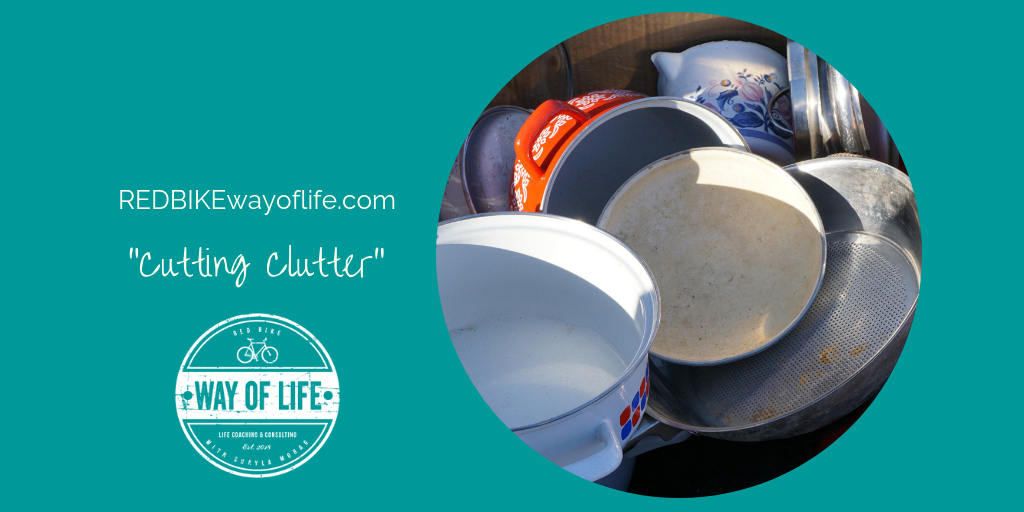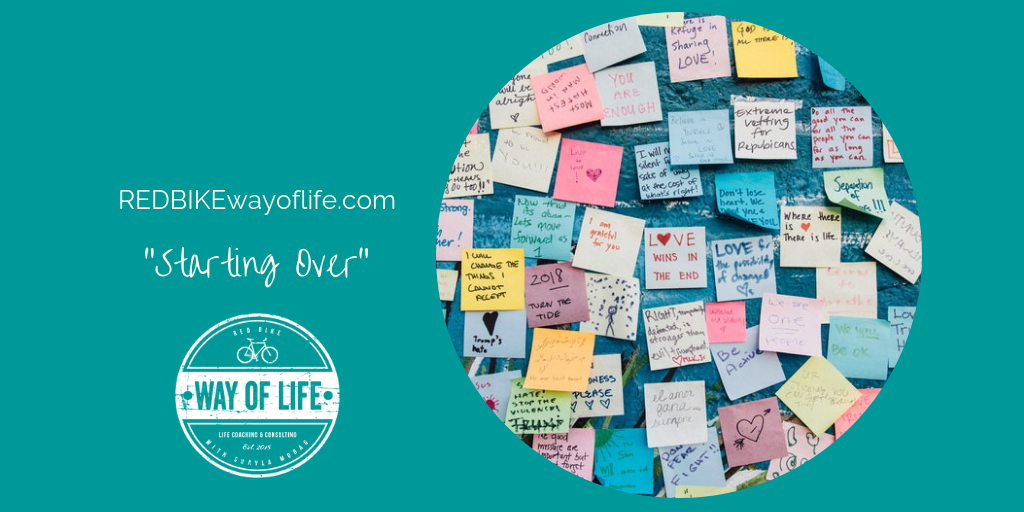
by Shayla Morag | Dec 13, 2018 | Handy Tips, Holidays, Preparation, Stress Management, The Red Bike Way
Strategies for Shopping Online
1) Cool off. Online purchases can pile up before you know it because there’s no downtime for parking and commuting. Try leaving items in your cart for at least 24 hours before making a final decision. You may find you no longer want them once you have a chance to think further.
2) Stop drinking. Even Chia Pets and novelty ties can look good during happy hour. Save the wine for later if it lowers your inhibitions.
3) Pay off credit cards monthly. Buying online is so easy it may not feel like real money. Avoiding credit card debt helps you monitor your spending and stabilize your finances.
4) Go to bed. The internet has no closing time so you’ll have to set your own curfew. You’ll feel fresher and richer in the morning if you turn of the computer and go to sleep.
Strategies for Shopping at Stores
1) Resist sales pressure. Be skeptical of limited time offers and long-term commitments. Tell sales clerks you need time to think, and do your own comparison shopping. Don’t let freebies make you feel obligated to buy something in return. Ask that any verbal promises be put in writing.
2) Carry a list. Write down what you need to pick up before you leave home. Go straight to the stores and aisles where you can find your products.
3) Look away. The more time you spend wandering around sales displays, the more likely you are to wind up with goods that sound like a bargain but wind up as clutter. Be especially careful in the checkout area that’s designed to trigger impulse purchases. Also, avoid touching any item that’s not on your shopping list or it might wind up in your garage.
Next time you’re at the mall or buying online, remember that today’s clutter is yesterday’s shopping spree. Save time and money by accumulating less. You and your home will come out ahead.

by Shayla Morag | Dec 04, 2018 | Cutting Clutter, Handy Tips, Stress Management, Support, The Red Bike Way
You can move clutter around or you can cut it off at the source. Instead of buying new storage containers or calling Goodwill for a pickup, take a look at your shopping habits. Imagine how much more you can enjoy your weekends and paychecks when you break the cycle of excess consumption. Take a look at these strategies for bringing less clutter into your life.
1) Buy what you need. Ask questions before you complete your purchase. How will you use the product you’re considering? Do you already have enough similar items at home?
2) Focus on quality. In the long run, higher priced goods usually offer greater value. A fine cashmere sweater or sturdy kitchen knives may hold up for decades while bargain brands may need to be replaced annually.
3) Stick to a budget. Decide in advance how much you can afford to spend. Regard occasional indulgences as an exception rather than the beginning of a habit.
4) Find other outlets. Retail therapy may be masking other issues. Find a hobby or do volunteer work if you’re bored. Talk with a friend if you’re feeling anxious or lonely.
5) Swap things out. During holidays and other shopping seasons, try discarding at least one item to make room for each new purchase. Give your used computer to a local nonprofit. Sell your old bedroom set on craigslist, Kijiji, or Facebook.
6) Buy for others. Studies show that spending money on others makes us happier than purchasing things for ourselves. Similarly, buying experiences instead of merchandise leaves no trail except for the pictures on your phone.

by Shayla Morag | Oct 29, 2018 | Change, Grief, Handy Tips, Self-Compassion, The Red Bike Way
You’ve thrown your hands up in the air and declared that something must change. Suffer a major loss? You’re ready for a fresh start. While your current situation may be challenging, the intention of making a fresh start is a good sign. It’s much better than giving up!
What do you need to change? Is it just one area of your life or do you need a complete makeover?
You can make a fresh start in any area of your life:
1. Home. Consider giving your living arrangement a makeover. You could move to a new home or change your existing home. Move the furniture or purchase new furniture. Paint the walls a new color. Convert a spare room into a room with a purpose. It could be dedicated to music, arts and crafts, or meditation.
2. Finances. Create a budget. Work a second job. Talk to a financial advisor. Find a job with a higher salary. Address your debt. Plan for your retirement. Look at your current financial challenges and finally address them with a detailed, step-by-step plan you can stick to.
3. Social life. It’s time to say goodbye to the people in your life that drag you down and replace them with those that provide a boost to your life. Meet some new friends and try a few new social activities. Work on your dating skills and catch the partner of your dreams.
4. Health and body. Hire a personal trainer and join a gym. Find a diet that works for you. Address any health issues you might have. Visit the doctor and the dentist. Try a new sport.
5. Career. Ask for a raise or change jobs. Grab your career by the horns and learn new skills that will make a difference. Consider going back to school.
6. Belief structure. Investigate a new religion or philosophy. Learn how to meditate. Question your beliefs and find a purpose. Read a good book each month and apply what you learn.
These are just a few ideas. You can also address your current relationships, attitude, or fears. It isn’t necessary to change everything at once. In fact, addressing one area at a time will yield better results.

by Shayla Morag | Aug 17, 2018 | Caregiving, Handy Tips, Recipe, The Red Bike Way
When I caregived my Mom, I found it super important that Mom and I eat together with a routine so that she would get healthy nourishment and food didn’t get hid or fed to the dog under the table. I discovered that preparing familiar recipes enticed appetite (and memories!) For example, my Mom recalled picking blueberries when she was a girl when I made blueberry cake or a smoothie and shared interesting stories about living on the back road. Having a bird feeder outside the window also inspired meal time conversations. Using dessert plates without patterns and serving small portions and soft foods seemed to work best.
Thought I would share my ‘Ginger Zinger Smoothie’ which was a popular choice at my former cafe. Enjoy!
1 frozen banana (8 chunks)
1/2 cup frozen blueberries
2 tsp. grated ginger
2 cups frozen kale
1 cup almond milk
1 tbsp. chia seeds
1/8 tsp. ground cinnamon
1 tbsp. raw honey

by Shayla Morag | Jul 05, 2018 | Caregiving, Handy Tips, Self Care, Self-Compassion, Self-Talk, The Red Bike Way
As a caregiver, we can sometimes feel stuck and need to look in the right place for answers. Asking yourself questions is an excellent way to find the answers you need. The right questions can be stimulating to your thought process. Ask yourself these questions and you’ll get answers that you can use.
Ask yourself the questions that matter the most:
How do I sabotage myself? We all sabotage ourselves. We talk ourselves out of things that would lead to success and happiness. We procrastinate. We compare ourselves harshly to others.
Make a list of the ways you’ve sabotaged yourself in the past. Be on the lookout for these same patterns in the future.
How can I use more of the useful knowledge and skills I already have? In today’s world, we know more than we ever have. The average person knows enough to make a million dollars, have the body of a Greek god or goddess, and marry a supermodel. Why don’t you use all the great things you already know?
Consider all the things you know about diet and exercise. Do you apply that knowledge?
How much do you know about saving and investing for the future? What can you do to brighten your financial outlook?
How much do you know about relationships? Are you taking full advantage of that information? Why not?
Imagine what your life would look like if you applied everything you already know. Most people are convinced they don’t know enough. In reality, they just don’t perform the actions that they know to be effective or avoid counterproductive actions.
Make a list of everything you do that you know you shouldn’t. Then make a list of everything you fail to do, but know that you should.
What can I control? What can I not control? We spend far too much time worrying about things that can’t be controlled. We spend too little time effectively controlling those things that are within our realm of control
Most of our childhood and early adulthood are spent trying to control the uncontrollable. Maturing is understanding what can be controlled and then figuring out the best way to control it.
What are you worrying about right now that you can’t control?
Why am I doing all of this? Most of the things we do are for others. You might think you’re going to the gym for yourself, but you might actually be going to impress others with your amazing physique.
How much are you actually doing for yourself? How many things do you do only because others are watching? Would you drive a luxury car if no one would ever know about it?
Are your goals about satisfying yourself or impressing others? Are you only trying to live up to the expectations of others?
What is most important to me? We spend too much time on frivolous activities, largely because we haven’t defined our priorities. What is most important to you?
If you could only have one career for the rest of your life, what would it be?
If you could only be with one person for the rest of your life, what characteristics would that person possess?
What are the three places you’d most like to visit?
What are the three things you’d most like to accomplish?
What are you going to make a priority in your life?
Consider the questions you ask yourself on a regular basis. In one form or another, most people are asking themselves, “How can I distract myself until…” By asking yourself more effective questions, you’ll get the answers you need to put your personal development into overdrive.

by Shayla Morag | Mar 22, 2018 | Caregiving, Handy Tips, Patience, Self Care, Support, The Red Bike Way
Being a caregiver can involve having a lot of patience. Patience is the ability to tolerate delay without frustration. Those with patience are able to remain calm and avoid impulsive action when faced with challenges. Being impatient has little to offer. The line at the store is impervious to your thoughts and emotions. If you’re stuck, you may as well enjoy yourself. Patience is beneficial to your health, happiness, relationships, and goals. Impatience is costly.
Consider these important benefits to having patience:
1. It’s easier to be happy when you’re patient. Impatient people are not experiencing positive feelings. Having patience reduces stress and anxiety. Challenging situations are more manageable when the situation can be approached with patience.
Has being impatient ever benefitted you? How do you feel when you’re impatient? Are you stressed? Happy? Uncomfortable? Are the patient people you know more or less happy than the impatient people you know?
2. Patient people are healthier. The stress that impatient people feel is hard on the mind and body. Those that feel less stress suffer from fewer medical issues. Heart conditions, ulcers, and many other health conditions are made more serious by stress. You can potentially live longer and enjoy yourself more if you’re patient.
3. You can accomplish larger goals. Big goals require time. Time requires patience. Big goals are impossible without some measure of patience. Consider how your impatience has short-circuited your success in the past.
4. Some things are outside your control and patience smooths the journey. Overcoming an illness or injury can’t be sped up by sheer will or impatience. A pregnancy requires a certain amount of time. Getting over a personal loss or tragedy takes time. Losing several pounds can’t happen overnight.
5. You’ll make better decisions. Impatient people don’t take the necessary time to make wise decisions. Impatient people are stressed, and stressed people tend to be impulsive. Patience provides the time and space to contemplate the situation and make a wise decision.
Make a list of the times when impatience has cost you. Consider your personal relationships, work, and finances. Impatience leads to poor decisions. Remind yourself of those times you’ve made your life more challenging by being impatient.
It’s possible for anyone to develop patience. Follow these steps:
1. Set short goals. For example, attempt to spend the next hour being the most patient person you’ve ever known. Avoid letting anything bother you during this period of time. Extend the time as you’re able.
2. Pause before everything you say and do. Do you want to get off the couch and raid the refrigerator? Make yourself wait 15 minutes. Are you ready to interrupt a conversation to make yourself heard? Wait until the conversation has concluded before speaking. Slow down and practice patience at every opportunity. The average day will provide plenty of practice!
3. Determine when you’re least patient. When do you find yourself unable to control yourself as well as you’d like? Focus your attention on these trouble spots. Aim for slow, steady progress. Avoid expecting perfection or making too many demands on yourself. Slow and steady wins the race.
4. Notice your thoughts when you’re impatient. What do you think about when you’re feeling impatient? Notice your thoughts and change them. You can choose to think about anything you’d like, so think about something that encourages you to be patient.
Patience is a character trait worthy of cultivation. Many confuse patience with weakness or passivity. But patience is an intelligent reaction to a situation that’s outside the realm of control. Impatience can be unhealthy, create additional challenges, and make you miserable in the process. Which do you choose?







